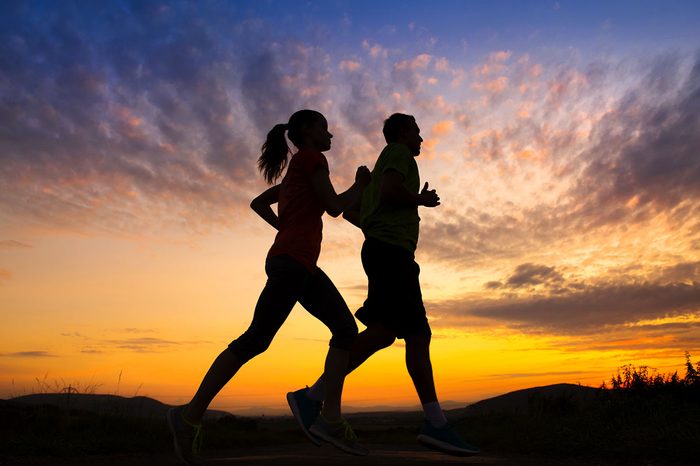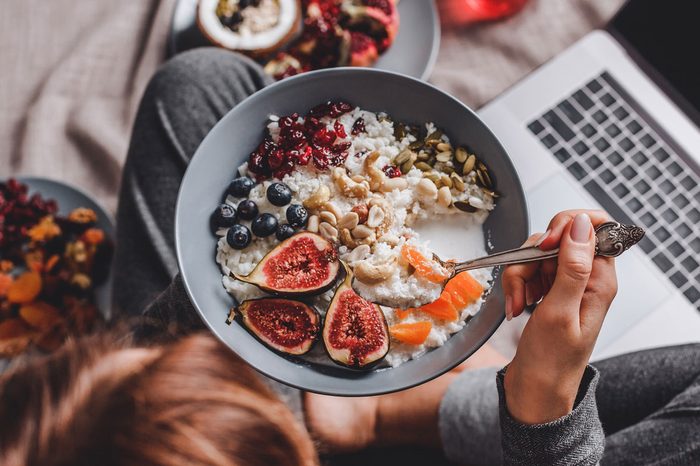
The Holistic Benefits of Exercise
We all have a general understanding that exercise is good for us (that’s nothing new), and we know that physical activity happens to be great for our hearts, too. But if you’re like most people, that’s not enough to kick your motivation into high gear and bring more sweat sessions to your daily life. And, sadly, the proof is in the statistics: According to the Canadian Physical Activity Guidelines, adults between the ages of 18 and 64 should be getting at least 150 minutes of moderate- to vigorous-intensity exercise every week, but few of us actually do. By and large, Canadians aren’t getting much exercise: Only 17 percent of us meet this goal.
Undoubtedly, exercise is an investment in life. Though there are already many compelling reasons to start moving at any age, experts are digging deeper into the holistic benefits of exercise, from improving our stress response to enhancing our sex lives. Here, we share the surprising truth about why getting physical may just save your life.

Reduces the Risk of Dementia
Over the next 30 years, the number of people with dementia is expected to triple, according to the World Health Organization. In a recent report released earlier this year, one of the most specific interventions for reducing the risk of cognitive decline and dementia is, you guessed it, regular exercise. Although most experts say we need more supportive research, staying active has proven to boost mental function and energy, while daily physical activity improves cognitive function among healthy elderly people, reducing the possibility of cognitive impairment. “Several studies have demonstrated the protective effect of physical activity on brain health, particularly by reducing the risk of neurodegenerative diseases,” says Eryn Jewitt, a professor at the School of Health Studies at Mohawk College in Hamilton, ON. “There is a strong positive relationship between exercise and cognitive health effects. A healthy body is a healthy mind.”

Enhances Sex Life
Who doesn’t want a better sex life? (We’ll wait.) The minds behind the Harvard T.H. Chan School of Public Health cite a resounding cure-all for low libidos, and that’s a mere 20 minutes of daily exercise. Not only does physical activity give you increased energy stores, but it also boosts your adrenaline and triggers all of those feel-good endorphins. One study found that 20 minutes of cycling boosts a woman’s sexual arousal by a whopping 169 percent (not bad), while other studies have investigated how exercise improves sexual function as well. Aerobic workouts (think running, biking and brisk walking) increase cardiovascular capacity and circulation, which means that blood can flow more quickly to your, uh, “parts,” which is excellent for sexual arousal and response. Alternatively, if strength training is more your thing, you’ll still reap the benefits: Regular weightlifting can boost your sex drive too, since it reduces stress and improves overall body image and self-confidence.

Changes Your Innards
Cells are constantly regenerating in our bodies, which means that our muscles rebuild at a rate of one to two percent each day. How does exercise influence this? When we put stress on our bodies through exercise, it moves this daily process in a positive direction: Exercise helps us regenerate in such a way that it makes us—and our cells—stronger. If we don’t exercise, we lose the opportunity to build a better machine. “If you use your muscles daily, they will stay strong,” says Alex Hutchinson, a science and exercise columnist and author of Endure: Mind, Body and the Curiously Elastic Limits of Human Performance. “Your muscle tissue will get the message, so if you keep on it, there is no reason why you can’t live a full, healthy life up until your very last days.”
Exercise improves muscle health by renewing its cellular heavyweight: mitochondria. Mitochondria are crucial for the proper functioning of our bodies, as well as improving overall health and longevity. Aerobic exercise is designed to remove damaged mitochondria in skeletal muscle. If you do this repeatedly (back to that daily exercise thing), you keep removing the damaged mitochondria, leaving behind better, higher-quality muscle. If you fill your engine with high-octane fuel, you’re going to be a lot more efficient.
“Exercise is more powerful than any other drug, and the evidence on why your body needs it is incontrovertible,” says Hutchinson. “When you exercise—even when you do a single workout—you fundamentally change how your body handles blood sugar and how flexible your blood vessels are. If you want to avoid type 2 diabetes, osteoarthritis and heart disease, you need to keep those vessels clear—exercise makes that happen.”

Improves Mental Health
“There isn’t a single part of the body that isn’t positively affected by exercise,” says Hutchinson, “but most people downplay its significant benefits on your mood and mental health.” Scientifically speaking, exercise produces a flood of “happy” brain chemicals, such as endorphins and serotonin, which give us a sensation of euphoria and positivity while increasing concentrations of norepinephrine, a chemical that can moderate our brain’s response to stress. While we all crave that euphoric sensation while we’re working out (it keeps us motivated), the actual rise in endorphins doesn’t really happen until after an hour or more of exercise. Remember that endorphins are a stress response, so the body needs to experience significant enough stress for endorphins to kick in. You have to get your body to a certain point to actually get that release.
Science-speak aside, Hutchinson is a big believer in the holistic gravitas of starting your day off with a little sweat. “If you start your day with exercise, it immediately feels better,” he says. “You have this feeling of satisfaction and accomplishment. You’re more focused, and you feel self-confident. Those feelings aren’t an illusion; they’re genuine.” (Also, you may want to read up on the mental health issues you’re most likely to get in every decade.)

Boosts Breathing
“When we talk about the long-lasting effects of exercise, it should be less about how we look in the mirror and more about how we optimize our bodies,” says Jewitt. Part of that puzzle is how we can improve VO2 max, which is the maximal oxygen uptake we can use during bouts of exercise and movement. VO2 max is generally regarded as the best indicator of cardiorespiratory fitness, and it reveals how much oxygen your body is able to consume during maximum effort.
The higher the VO2 max, the more oxygen your body can use and the better your aerobic fitness. Why does this matter? “Your VO2 supports total body health and incorporates your cardiovascular, respiratory, nervous and musculoskeletal systems,” says Jewitt. “Improving the volume of oxygen that you can use in your body—your VO2—affects everything you do, in or out of the gym, whether that’s keeping up with your grandkids or picking up your groceries.” Plus, she goes on to say, who wouldn’t want to be able to breathe more efficiently on the daily?

Battles a Bad Day
Bad things happen in our lives all the time. It’s how we manage these stressful situations that allows us to have a leg up. Jewitt’s strategy? Something she calls “stress-management exposure.” If you choose to do something challenging (ahem, exercise), you help build the neurochemical pathways to make your mind stronger. You strengthen your brain, just like a bicep curl enhances your body, which, in turn, works to combat those overwhelming feelings of stress and anxiety. Exercise reduces levels of the body’s stress hormones, such as adrenaline and cortisol, and stimulates mood elevators in your brain. “It’s like meditation in motion,” she says. “If you play a fast-paced game of tennis or sweat through a hot yoga class, the last thing you’ll think about is the day’s annoyances. Exercise helps get rid of daily tension, so you’ll feel more optimistic in everything you do.”
Jewitt is also keen to acknowledge that any form of exercise can act as a stress reliever, so even if you’re not an athlete, you can still make a little exercise go a long way toward stress management.

Aids Digestion
The secret to a healthier you is to listen to your gut: 80 percent of your immune system is in your intestinal tract, and the state of your gut can dictate how you feel, both physically and mentally. Slow digestion is uncomfortable and can leave you feeling bloated and fatigued. Though proper nutrition plays a significant role, exercise and, more generally, activity also influence the function of your digestive system. Cardiovascular exercise, such as walking, running and yoga, helps strengthen abdominal muscles, increase your heart rate and reduce intestinal sluggishness by stimulating your muscles to push digestive waste through your body. Because your muscles are more efficient when you’re in shape, the amount of blood diverted from your digestive system decreases because the need is less urgent, which means that you’ll digest food more quickly.

Reverses the Clock
A study published at Harvard Medical School found that as little as 15 minutes of physical activity each day can increase your lifespan by three years, and the benefits increase with each minute of activity you add—just as long as you do it every day. Physical activity helps hold back cell aging while reducing inflammation, which affects the health of your heart and arteries. The good news is that exercise doesn’t necessarily have to be rigorous—low-intensity exercise can be just as beneficial. The important thing is to commit to doing it regularly. “Don’t get hung up on the perfect exercise program or the latest fitness fad that your friends are telling you is their secret to being fit,” says Hutchinson. “What matters is that you do something you want to sustain in the long term. It has to be something you enjoy because if you don’t find something that works for you, logistically and temperamentally, it will be an uphill struggle for sure.”
Now that you’ve read up on the holistic benefits of exercise, check out these science-baked ways to increase your longevity.
